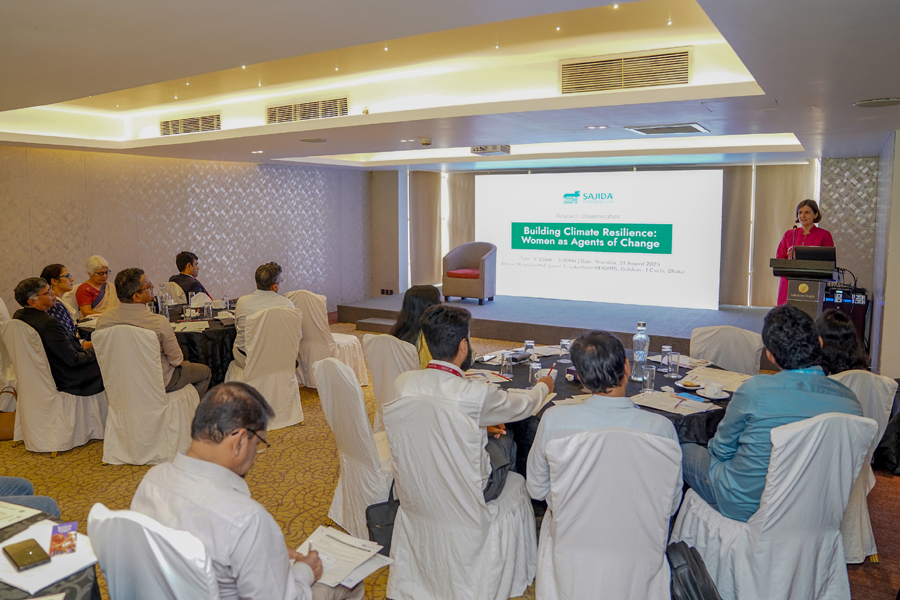SAJIDA Foundation shares insights on women-led climate resilience

Published :
Updated :

SAJIDA Foundation hosted a research dissemination event titled “Building Climate Resilience: Women as Agents of Change” in Dhaka on Thursday (August 21).
Policymakers, researchers, practitioners, and community representatives joined the half-day event to explore community-led, locally driven strategies for strengthening climate resilience in Bangladesh’s most vulnerable regions.
The event presented findings from the Building Climate Resilient Food Systems in Bangladesh (BCFS) and Eliciting Needs-based Grassroots Action through Cross-Group Engagement (ENGAGE4Sundarbans) projects.
The ENGAGE4Sundarbans, currently being implemented in Protapnagar, a low-lying coastal union where climate change is a daily reality. After years of salinity intrusion, cyclones, land degradation, and damaging shrimp farming practices, prolonged flooding following Cyclone Amphan (2020) spurred the community to elect new leadership, ban shrimp enclosures, and return to agroecological farming.
Launched in 2023 and funded by the Swiss Agency for Development and Cooperation (SDC) and the Swiss National Science Foundation (SNSF), ENGAGE4Sundarbans supports the community in restoring land, scaling traditional agroecological practices, and strengthening linkages between local farmers, high-end markets, and startups — ultimately building both social and climate resilience.
Speaking at the dissemination event after a keynote presentation on the ENGAGE4Sundarbans project, Corinne Henchoz Pignani, Head of Cooperation, Embassy of Switzerland in Bangladesh, highlighted the activities the Swiss funding agencies and NGOs are doing in the Climate Action at Local Level (CALL) programme.
“What we’re trying to do with CALL is to work at the local community level in left behind regions where we support locally-led answer to the impact of climate change – be it adaptation or mitigation,” she said.
She expressed the hope that there would be greater cooperation between CALL and ENGAGE4Sundarbans for locally-led adaptation and mitigation.
Dr Sajeda Amin, Senior Research Advisor, SAJIDA Foundation, in her address, said “There is a gap between researchers and implementers. We need to bridge the gap between people, research, programmes, and bureaucracy for better results.”
She laid emphasis on the need for understanding local cultures for better communication with local communities and thus ensuring greater impact of any programme.
The Building Climate-resilient Food Systems in Bangladesh (BCFS) project, led by SAJIDA Foundation in partnership with Citi Foundation, aims to strengthen food security for climate-vulnerable communities by developing a resilient food supply chain.
Using climate-smart agriculture, the initiative seeks to boost agricultural production and diversity, establish grain and seed storehouses to reduce post-harvest losses, and create stronger market linkages. It also focuses on providing timely weather and agrometeorology information, ensuring communities can adapt quickly and maintain stable food supplies in the face of climate shocks.
Dr Shah Abdul Saadi, Deputy Secretary, Economic Relations Division (ERD) under the Ministry of Finance, Bipasha Hossain, Country Representative at IUCN, Dr Haseeb Irfanullah, Visiting Research Fellow at University of Liberal Arts Bangladesh (ULAB), and Dr AKM Nuruzzaman, General Manager at Palli Karma-Sahayak Foundation (PKSF), participated in the plenary session as expert discussants.
The panel was moderated by Md Fazlul Hoque, Deputy Chief Executive Officer, SAJIDA Foundation.


 For all latest news, follow The Financial Express Google News channel.
For all latest news, follow The Financial Express Google News channel.